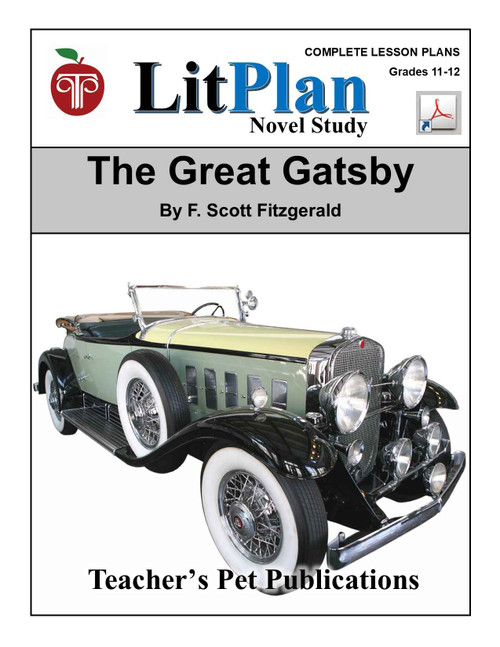Product Overview
The Great Gatsby: Questioning Monetary Success
Gatsby is shown as having achieved the American Dream, going from rags to riches, but to what end? Students usually enjoy reading Gatsby for the lavish materialism of the 1920's and the love story between Daisy and Gatsby, but the story offers the opportunity to really analyze what is behind it all.
Ordering Books for The Great Gatsby by F. Scott Fitzgerald
No order minimum; you can order just one copy if that's all you need! :-) Order your class set of books for The Great Gatsby now, and take advantage of our bulk order discounts!
Notes About The Literary Touchstone Classics Edition of The Great Gatsby
We think the Literary Touchstone Classic edition of The Great Gatsby is the best for classroom use. These affordable editions of beloved works are designed by former educators with the needs of both teachers and students in mind.
To help students fully understand the classic work they're studying, every Literary Touchstone Classic includes pre-reading notes that cite important aspects of the text that students should examine and question while reading. Each book also contains an extensive vocabulary list and a glossary that explains unfamiliar allusions and challenging passages.
If you're looking for books that will last for years, Literary Touchstone Classics fit the bill. Sturdy bindings and high-quality paper ensure they'll hold up to repeated use, and they're made in the U.S.A.
Other Editions
If you need to add onto a class set of a different edition or simply prefer another edition, contact us with the ISBN, and we'll check the availability for you.
About the Book The Great Gatsby |
The Great Gatsby is set in the Roaring Twenties, a period of great economic prosperity and cultural change in the United States. The story is narrated by Nick Carraway, a Yale graduate and World War I veteran who moves to Long Island's North Shore to learn about the bond business. Nick becomes neighbors with Jay Gatsby, a mysterious and wealthy man known for throwing extravagant parties. Despite his opulent lifestyle, Gatsby is deeply lonely and fixated on rekindling a past romance with Daisy Buchanan, Nick's cousin. Daisy is married to Tom Buchanan, a wealthy but arrogant man who is having an affair with Myrtle Wilson, the wife of a mechanic. As the summer progresses, Gatsby and Daisy rekindle their love, but their relationship faces numerous obstacles, including Tom's interference. The tension culminates in a confrontation at the Plaza Hotel, where Tom reveals Gatsby's involvement in illegal activities to accumulate his wealth. Daisy ultimately chooses to stay with Tom. Tragedy strikes when Gatsby is killed by George Wilson, who mistakenly believes Gatsby was driving the car that killed Myrtle in a hit-and-run accident. In reality, Daisy was driving, but Gatsby takes the blame to protect her. Nick organizes Gatsby's funeral, which is sparsely attended, highlighting the emptiness of Gatsby's life despite his wealth. Disillusioned by the East Coast's moral decay, Nick returns to the Midwest.
|
Themes in the book The Great Gatsby |
The American Dream: One of the most prominent themes in The Great Gatsby is the critique of the American Dream. Gatsby's rise from poverty to immense wealth embodies the quintessential American success story. However, his inability to achieve his ultimate dream—winning Daisy's love—reveals the hollowness and corruption underlying the pursuit of material success. Class and Social Status: The novel explores the rigid class structures of the 1920s. Characters like Tom and Daisy represent the old money elite, while Gatsby symbolizes the self-made, nouveau riche. The tension between these classes underscores the novel's critique of social stratification and the illusion of the American Dream. Love and Relationships: Love in The Great Gatsby is portrayed as complex and often destructive. Gatsby's idealized love for Daisy contrasts sharply with the reality of her shallow and self-centered nature. Similarly, Tom and Daisy's marriage, though outwardly stable, is fraught with infidelity and emotional detachment. Moral Decay: The novel paints a grim picture of the moral decadence of the 1920s. The lavish parties, infidelity, and lack of genuine human connection among the characters serve as a critique of the era's hedonism and materialism. The Past and Memory: Gatsby's obsession with reliving the past is a central theme in the novel. His desire to recreate his romantic history with Daisy ultimately leads to his downfall, illustrating the futility of trying to recapture lost time.
|
Activity Ideas for the book The Great Gatsby |
Discussions: Hold discussions to encourage deep, student-led discussions about the novel's themes, characters, and symbols. Provide open-ended questions such as:
Historical Context Research: Assign students to research the historical context of the Roaring Twenties, including Prohibition, the rise of consumer culture, and the Jazz Age. Understanding the social and economic backdrop of the novel can enhance their comprehension of its themes and characters. Symbolism Analysis: The Great Gatsby is rich with symbols, such as the green light at the end of Daisy's dock and the eyes of Doctor T.J. Eckleburg. Have students identify and analyze these symbols, discussing how they contribute to the novel's themes and message. Character Analysis: Have students analyze the main characters in the book (Gatsby, Daisy, Tom, Myrtle, Nick), including their characteristics, motives, ambitions (or lack thereof), etc.
|

Customer Service
- We guarantee you'll have the best customer service experience ever with Teacher's Pet Publications.
- We are here to help make things as easy as possible for you!
- Your information is secure. We don't keep your card number on file anywhere, and we don't sell, rent, or give away your personal information.
- We treat you as we would like to be treated as a customer!
- Need help? Have questions? We're always happy to assist you! Contact Us











